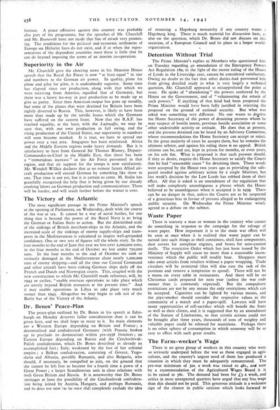Detention Without Trial
The Prime Minister's replies to Members who questioned him on Tuesday regarding an emendation of the Emergency Powers Act Regulation -r8a,- in the light of the recent ruling of the House of Lords in the Liversidge case, cannot be considered satisfactory. Owing no doubt to the fact that other duties .had prevented him from giving detailed study to what is very largely a technical question, Mr. Churchill appeared to misapprehend the point at issue. He spoke of " abandoning " the powers conferred by the House on the Government, and of " volunteering the return of such powers." If anything of that kind had been proposed the Prime Minister would have been fully justified in rejecting the proposal on the ground of national security. But what was asked was something very different. No one wants to deprive the Home Secretary of the power of detaining persons whom he may suspect of hostile intent, previous hostile association or some other undesirable activity or attitude. He does that at present, and the persons detained can be heard by an Advisory Committee, whose recommendations the Home Secretary can accept or reject. In the great majority of cases he accepts them, but he remains the ultimate arbiter, and against his ruling there is no appeal. British citizens can be, and are, kept in prison for months, or even years, on his sole fiat. What is proposed is that such persons should, if they so desire, require the Home Secretary to satisfy the Courts that he had "reasonable cause" for detaining them. Those words were accepted by the House two years ago as providing the safe- guard needed against arbitrary action by a single Minister, but last week's decision by the Law Lords has robbed them of their effect. All that is asked is an amendment of the regulation that will make completely unambiguous a phrase which the House believed to be unambiguous when it accepted it in 1939. There can be no danger in that, unless the Courts are to be suspected of a gratuitous bias in favour of persons alleged to be endangering public security. On Wednesday the Prime Minister wisely agreed to a debate on the subject.






















 Previous page
Previous page